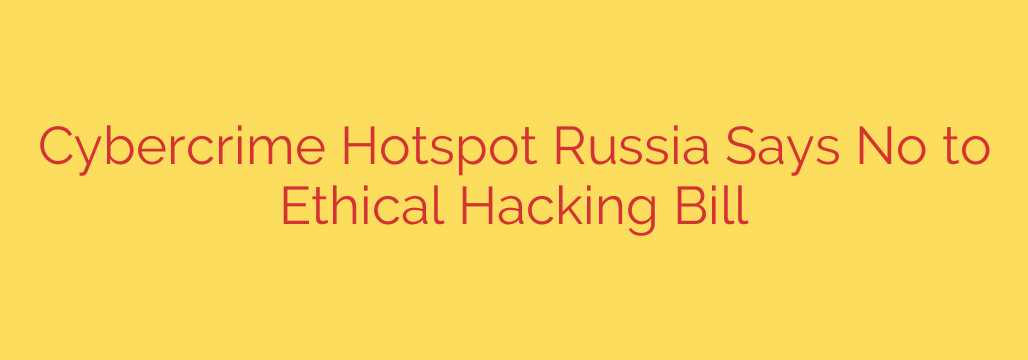
Russia Opts Against Formalizing Ethical Hacking Amidst Cybercrime Concerns
In a significant development within the cybersecurity landscape, Russia has reportedly rejected proposed legislation aimed at regulating ethical hacking and penetration testing activities. This decision comes amidst the country’s persistent association with global cybercrime and nation-state sponsored cyberattacks, raising questions about its approach to internal cyber defense.
Ethical hacking, often referred to as penetration testing, involves authorized attempts to penetrate computer systems, networks, or applications to identify security vulnerabilities before malicious actors can exploit them. It is a critical component of modern cybersecurity strategy, allowing organizations to proactively strengthen their defenses. Cybersecurity professionals performing these tasks typically operate under strict contracts and legal frameworks to ensure their actions remain within legal and ethical boundaries.
The proposed bill, which was reportedly under consideration, sought to create a formal legal basis for ethical hacking activities within Russia. Proponents likely argued that such regulation would provide clarity for cybersecurity professionals, establish standards, and potentially integrate legitimate security testing into the national cyber defense framework. This could, in theory, help identify and mitigate vulnerabilities within Russian systems and infrastructure.
However, the reports indicate the bill faced rejection. While the exact reasons cited for the rejection can be complex, common arguments against formalizing ethical hacking laws in various jurisdictions often include concerns about potential misuse of such access and tools, difficulties in clearly defining the scope and boundaries of ‘ethical’ activities, and the argument that existing laws are sufficient to cover both malicious and potentially unauthorized ‘ethical’ hacking (even if enforcement against malicious actors is inconsistent).
This decision is particularly noteworthy given Russia’s reputation in the international cybersecurity community. The rejection of a bill that could potentially bolster internal vulnerability identification efforts seems counterintuitive to strengthening the nation’s own cyber resilience. Critics may argue that this stance hinders legitimate security work that could protect Russian businesses and critical infrastructure from the very threats emanating from cybercriminal elements, some of whom operate from within the country.
For businesses and organizations globally, this situation underscores a crucial point: proactive cybersecurity measures, including ethical hacking and vulnerability assessments, are indispensable regardless of specific national legal frameworks. Relying solely on government regulation or enforcement is insufficient. Organizations must take ownership of their digital security by regularly testing their systems for weaknesses and implementing robust defense strategies.
Ultimately, the decision by Russia to not proceed with formal legislation for ethical hacking highlights a complex intersection of national policy, cybersecurity needs, and the challenges of regulating a rapidly evolving digital domain. It leaves the status of penetration testing activities within the country in a less formalized state, which could have implications for internal cybersecurity practices.
Source: https://go.theregister.com/feed/www.theregister.com/2025/07/10/russia_ethical_hacking_bill/








